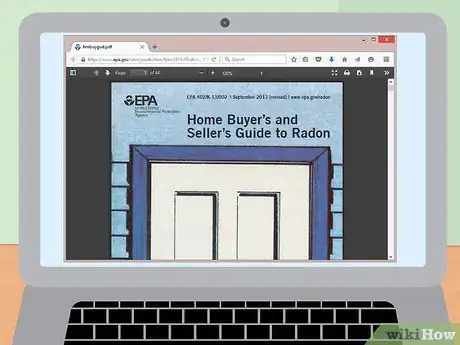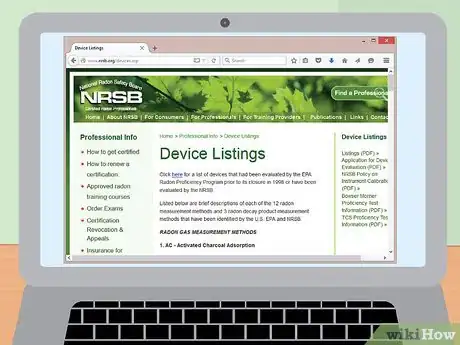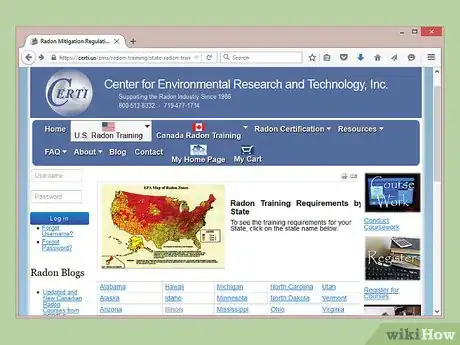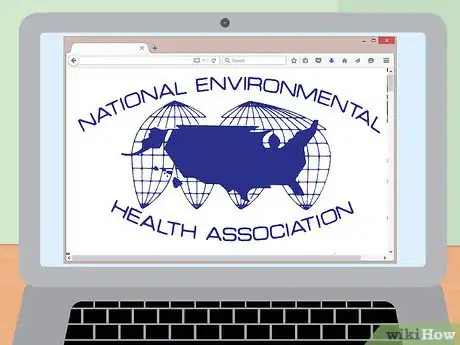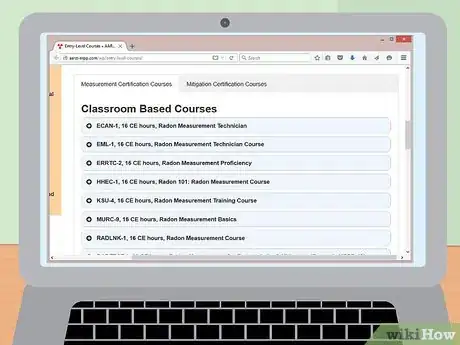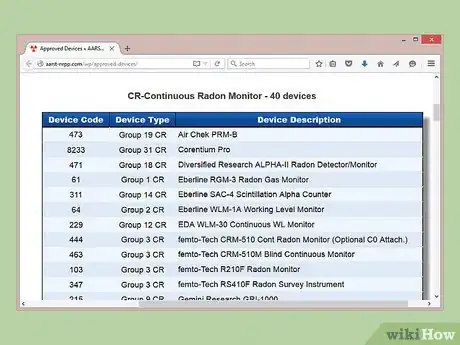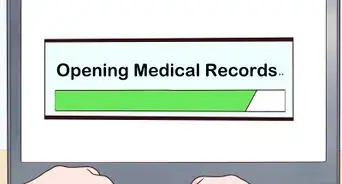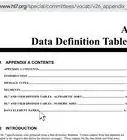This article was co-authored by wikiHow Staff. Our trained team of editors and researchers validate articles for accuracy and comprehensiveness. wikiHow's Content Management Team carefully monitors the work from our editorial staff to ensure that each article is backed by trusted research and meets our high quality standards.
There are 11 references cited in this article, which can be found at the bottom of the page.
This article has been viewed 30,972 times.
Learn more...
Radon cannot be seen or smelled but is present in hundreds of thousands of buildings and is responsible for 21,000 lung cancer deaths annually in the United States alone. There's one way to see if the gas levels are too high in a building: do a test for radon. Starting a radon testing business can provide a viable source of income while helping others improve their living situations. However, doing so requires a good understanding of the testing method, how to reach customers, and where to refer them for radon mitigation if necessary. Use the following steps to start a radon testing business.
Steps
Becoming Qualified
-
1Research radon on the Environmental Protection Agency's (EPA's) website. Before you can start a radon testing business, you'll need to know much more about its practice. This information can be found by researching radon online or by viewing the EPA's introductory guide at https://www.epa.gov/sites/production/files/2015-05/documents/hmbuygud.pdf. Links to more articles and additional sources can be found at https://www.epa.gov/radon. Focus on learning important facts, such as:
- According to the EPA, all homes and schools below the third floor are at risk for high levels of radon.
- Buildings in certain areas of the country are more susceptible to high levels of radon.
- EPA guidelines state that any result over 4.0 pCi/L (picocuries per liter) represents an unsafe level of radon.[1]
-
2Learn about the types and proper usage of radon test kits. There are 2 types of radon testing kits: short-term and long-term testing kits. Short-term kits test the radon levels in a home for a period of time between 2 and 90 days, depending on the type of kits. Long-term kits stay in a home for over 90 days and offer a more accurate reading of the year-round radon levels in a home.
- All radon kits should be placed on the lowest lived-in area of a home or building. Place them at least 20 inches (50 cm) off the floor and away from exterior walls, drafts, and high humidity or heat.[2]
- There are many different types of radon test kits, each with different specific benefits and drawbacks. Read through the different types at http://www.nrsb.org/devices.asp.
Advertisement -
3Check for state licensing requirements. Some states regulate radon professionals independently or EPA guidelines. These states may require those who measure or those mitigate radon levels, or both, to obtain and maintain a license to do so. Others may simply require them to register. In any case, you'll need to check with the appropriate regulatory body in your state to find out what its requirements are.[3]
- State requirements can be found by visiting https://certi.us/cms/radon-training/state-training-requirements and selecting your state.
-
4Determine which professional certification you need. Even if your state does not require you to be licensed, you should still seek professional certification to gain credibility with your customers. The National Environmental Health Association (NEHA) certifies radon professionals as part of the National Radon Proficiency Program (NRPP). Certified radon testers and mitigators are also listed on the NRPP's website, making you more visible to potential customers.[4]
- To become certified, you will need to take a qualifying education course and then pass a certification exam. At this point you can apply for NRPP certification.
- There are two different measurement (testing) certifications: standard services and standard and analysis services. The second includes a device performance test and the ability to analyze radon test results yourself rather than sending your device to a lab.
-
5Study for and pass certification exams. Certification courses can be found at http://aarst-nrpp.com/wp/entry-level-courses/. There are options that take place in actual classrooms and some that are done entirely online. Anyone looking to start a radon testing business should take and pass one of the radon measurement courses. The exam will be offered at the end of the in-class course or can be signed up for at http://www.psiexams.com/.
- Courses are 16 hours in total and cover everything from the science behind radon creation to choosing a test device and analyzing results.
- Exams are typically 100 multiple choice questions, which you will have 2 hours to complete.
- Exam fees are $110.00.[5]
- Certifications last for two years, after which point they can be renewed with the appropriate continuing education.[6]
Planning Your Business
-
1Conduct market research. Research whether there's a need for a radon testing business in your area. Check online and in the phone book for similar, existing businesses. If there already are a number of established radon testing businesses, expand your potential customer base to another area. Or, if you can, identify an underserved market for radon testing.
- For example, there are a variety of potential customers of a radon testing business, from landlords and homeowners to large business and local governments.
- Try talking to realtors to assess the market for residential testing in your area. Forming relationships with them may also later prove useful, as they can provide you with referrals.[7]
-
2Write a business plan. Before you can start your business, you will need a plan for operating it. This includes addresses how much it will cost to get started. Expenses to consider include the costs of your start up, testing kits, transportation, marketing, and taxes. Describe how you will find customers, what testing options you will offer, and what your projected income is for the first 2 years. Also include a list of radon mitigation companies that you can refer customers to if their tests reveal high radon levels.
- You should also consider where you will work from. It is possible to run this type of business from home, so that should be your first option is costs are an issue.
- Include a description of the planned structure for your business. Most radon testing businesses are sole proprietorships, but you may want to consider other structures, like an LLC or partnership.[8]
-
3Investigate where to buy radon kits wholesale. Search for professional radon testing kits by searching for suppliers online. Make sure to check the reputation of each supplier by reading consumer reviews and asking for references. Also inquire how long it takes to deliver each order of radon tests, and how much they cost. Make sure you're getting professional radon testing kits instead of consumer ones. Otherwise, customers will have no reason to hire you.
- The Radon Testing Corporation of America, PRO-LAB, and AccuStar are all reputable providers of testing equipments.
- See the NRPP's full list of approved devices by visiting their website at http://aarst-nrpp.com/wp/approved-devices/.
-
4Raise the capital you need to start a radon testing business. You won't need much money to get started, but you will have to raise that money somehow if you don't already have it. Your options for doing so include taking out a small business loan, obtaining a personal loan from a friend or family member, or selling your own assets. If you choose to get a loan, seek a business loan guaranteed by the Small Business Administration (SBA), as this may be easier for the average borrower to qualify for.[9] Your startup costs will include the following:
- Testing kits and a method to have them analyzed. Many kits include free lab testing. The cost of these will vary based on what type of kits you choose and how many you buy to start.
- Certification fees if you have not already been certified.
- Transportation expenses.
- Funds for advertising. This amount can vary widely and depends on how actively you plan to advertise.
- Insurance. Radon measurement professionals will need errors and omissions or general liability insurance to protect them from legal action. Specific radon professional insurance plans are available through the North American Professional Liability Insurance Agency (NAPLIA).[10]
Beginning Operations
-
1Register your business with your city. Check with your city or county office to see what specific license requirements you have to meet. In most cases, you will need to register a "doing business as" (DBA) name. This name distinguishes your business from you and must be unique (not already taken by another business). Contact the relevant local office to register your DBA name.[11]
-
2Buy your testing supplies. Place your order for your radon testing supplies based on how many homes or businesses you think you'll service during your initial operations. You can always buy more later if you need them. Most sites will have the supplies listed by how many locations they can test.
- Divide the price of the testing supplies by the number of tests they offer to arrive at a test per measurement cost. You can shop around to reduce this cost and, in doing so, increase your profit margin.
-
3Market your business. Print business cards, flyers, and price lists to give to potential customers. Also promote your business on the Internet by means of a website and social networks. Consider purchasing radio or newspaper advertisements if you have the money for it. You can also engage in free marketing by networking with local contractors, inspectors, real estate agents, and builders who might have use of your radon testing services.
- Your radon testing education should have given you the tools you need to explain radon risks to customers. Use this information as part of your marketing strategy to explain to them why they need to have their home tested and the risks of not doing so.[12]
-
4Form a relationship with a radon mitigation business. Once your business is running, you may have certain customers with unsafe levels of radon in their home or business. In this situation, you will want to know of a reputable radon mitigation business to which you can recommend your customers. You can even negotiate a "finder's fee" where you get a portion of the mitigator's earnings from customers you send their way. Search for radon mitigation specialists in your area by visiting the NRPP's website.
- You can also offer to do the post-mitigation testing required to make sure the mitigation efforts have been effective.[13]
References
- ↑ http://web.archive.org/web/20071224030656/http://www.radon.com/radon/mitigation.html
- ↑ https://www.epa.gov/sites/production/files/2015-05/documents/hmbuygud.pdf
- ↑ https://www.epa.gov/sites/production/files/2015-05/documents/hmbuygud.pdf
- ↑ http://web.archive.org/web/20071224030656/http://www.radon.com/radon/mitigation.html
- ↑ http://aarst-nrpp.com/wp/entry-level-courses/
- ↑ http://aarst-nrpp.com/wp/certification/how-to-become-certified/
- ↑ https://www.entrepreneur.com/businessideas/home-inspection
- ↑ https://www.entrepreneur.com/article/247574
- ↑ http://www.forbes.com/sites/brentgleeson/2013/08/29/4-realistic-ways-to-fund-your-small-business/#4a890817a576
